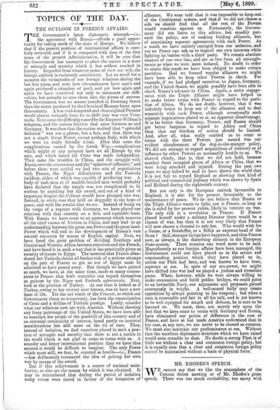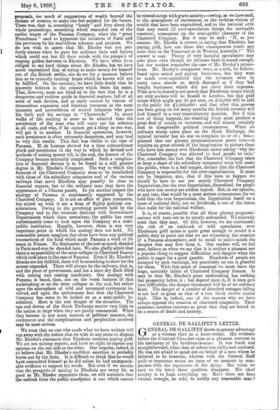MR. RHODES'S SPEECH.
WE cannot say that we like the atmosphere of the Cannon -Street meeting or of Mr. Rhodes's great speech. There was too much excitability, too many wild proposals, too much of suggestions of wealth beyond the dreams of avarice, to make one feel satisfied for the future. There was, that is, something "heady" and fiery about the whole proceedings, something which reminded one of the earlier stages of the Panama Company, when the "great Frenchman" used to hypnotise the investors of Paris and the provinces by his marvellous schemes and projects. We do not wish to assert that Mr. Rhodes was not per- fectly sincere when he gave his audience facts and figures which could not but fill their minds with the prospect of reaping golden harvests in Rhodesia. We have often been obliged to say hard things about Mr. Rhodes, but we have never represented him as trying to make money for himself out of the British public, nor do we for a moment believe him to be cynically exciting hopes which he knows will not be frilfilled. On the contrary, we have little doubt that he sincerely believes in the country which bears his name. That, however, must not blind us to the fact that he is a dangerous and reckless guide in financial matters, full of all sorts of rash devices, and as easily excited by visions of tremendous expansion and limitless resources as the most innocent and nnworldwise of retired Admirals who puts his faith and his savings in " Chartereds." In many walks of life nothing is more to be admired than the persistency of the man who will carry out his schemes at all costs, and who, if he cannot get a thing in one way, will get it in another. In financial operations, however, such persistence is often extremely dangerous, and may lead to very dire results. This fact was visible in the case of Panama. M. de Lesseps showed for a time extraordinary plack and persistence in the way in which he devised new methods of raising money till, in the end, the finance of the Company became extremely complicated. Such a complica- tion of financial devices is to be found in a still greater degree in Mr. Rhodes's Company. The way in which the finances of the Chartered Company seem to be inte,rlocked with those of the subsidiary companies and of the various railways that serve Rhodesia may possibly be clear to finaneial experts, but to the ordinary man they have the appearance of a Chinese puzzle. In yet another respect the analogy of Panama is unpleasantly suggested by the Chartered Company. It is not an affair of pure commerce, but mixed up with it are a heap of flighty political con siderations. Owinc, to the governing powers held by the Company and to the constant dealings with Government Departments which these necessitate, the public has most unfortunately come to look .upon the Company as a semi- public institution. Happily, however, there is one very important point in which the analogy does not hold. No reasonable person imagines that there have been any political transactions of the kind which made Panama a word of
ill-
omen in France. No disclosures of the sort so much dreaded in Paris need ever be dreaded here. We also gladly admit that there is no possibility of the utter collapse in Chartered finance which took place in the case of Panama. Even if Mr. Rhodes's dreams are not fulfilled, there will be something to show for the money expended. There will always be the railways, that is, and the plant of government, and not a mere dry ditch filled with rotting and rusting machinery. Our analogy with Panama is then, not on the worst features of that undertaking or on the utter collapse at the end, but rather upon the atmosphere of wild and unnatural excitement in- volved, and upon the unfortunate fact that the Chartered Company has come to be looked on as a semi-public in- stitution. Here is the real danger of the situation. The up a and downs of the Stock Exchange matter very little to the nation at large when they are purely commercial. When they become in any sense matters of political' concern the excitement and the complications and perplexities involved may be most serious.
• We trust that no one who reads what we have written will ran away with the notion that we wish in any sense to dispute Mr. Rhodes's statement that Rhodesia contains paying gold. We are not mining experts, and have no right to express any opinion on the one side or the other. Our impulse, indeed, is to believe that Mr. Rhodes's confident assertion is probably borne out by the facts. It is diftic,ult to think that he would have committed himself as he did unless he had unimpeach- able evidence to support his words. But even if we assume that the prospects of mining in Rhodesia are every bit as good as Mr. Rhodes represents them, we still maintain that the outlook from the public standpoint is one which cannot be viewed except with grave anxiety,—Owing, as we have said, to the atmosphere of excitement, to the reckless visions of wealth that have been engendered, and to the national evils that may result (if over-speculation brings the inevitable reaction), consequent on the semi-public character of the Chartered Company. But it may be said If, as you assume, Mr. Rhodes is correct in saying that Rhodesia has paying gold, how can these dire consequences result any more than in the Transvaal or in Western Australia ? ' The answer is easy. Plenty of very harmful speculation may take place even though its ultimate basis is sound enough.. Let our readers remember the case of Mr. Hooley's promo- tions. Mr. Hooley's companies were, as a rule, we believe, based upon sound and paying businesses, but they were so much over-capitalised that the investors were in many cases almost as much damaged as if they had bought businesses which did not cover their expenses. What is to be feared is not merely that Rhodesian mines which are only pockets will be floated in London, but that gold mines which might pay 10 per cent. on £50,000 will be sold to the public for £1,000,000; and that after this process has been going on for many months the British investor will find himself in a very unsatisfactory position. But if this sort of thing happens, the resulting crisis must produce a great deal or misery to investors, and will almost certainly lead to disagreeable political consequences. When an ordinary slump takes place on the Stock Exchange, the injured investor has no one to complain to or of ; but— granted that our gloomy prognostications prove true—it requires no great stretch of the imagination to picture those who have lost money over Rhodesian mines asking why the Chartered Company was allowed to lead people to ruin.' For, remember, the fact that the Chartered Company takes so large a share of the subsidiary companies' scrip will make the public, when in a bad temper, declare that the Chartered Company is responsible for the over-capitalisation. It must not be forgotten, also, that if this were to happen we should be sure to see not merely Chartered Company Imperialism, but the true Imperialism, discredited, for people who have lost money are seldom logical. But, in our opinion, at any rate, that would be a most serious consequence, for we hold that the true Imperialism, the Imperialism based on a sense of national duty, not on dividends, is one of the forces that make for the national welfare.
It is, of course, possible that all these gloomy prognosti- cations will turn out to be utterly unfounded. We sincerely trust that they may. Of this, however, we are convinced; the risk of an outbreak of wild speculation over Rhodesian gold mines is quite great enough to render it a public duty to point out that we are witnessing the creation of a Panama atmosphere, and to recall to men's minds the dangers that may flow from it. Our readers will, we feel sure, believe us when we say that it is neither a pleasant nor a popular thing to suggest difficulties and dangers when the public is eager for a good gamble. 'Hundreds of people are annoyed by such warnings, but practically no one is grateful for them. With this much of comment we must leave the huge, unwieldy fabric of Chartered Company finance. It may be that Mr. Rhodes's great undertaking has nothing but prosperity before it ; but depend upon it, if it once gets into difficulties, the danger threatened will be of no ordinary kind. The danger of a number of detached cottages falling is not half so great as that of a vast block twelve stories high. This is, indeed, one of the reasons why we have always opposed the creation of chartered companies. Their existence involves interests so great that they are bound to be a source of doubt and anxiety.







































 Previous page
Previous page